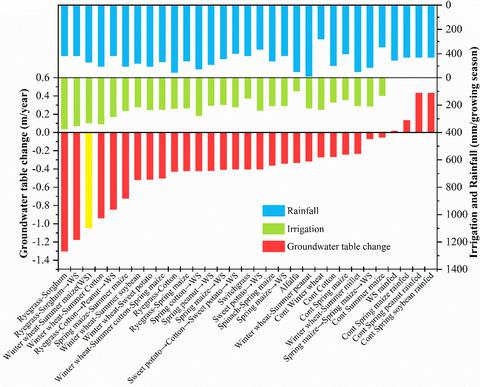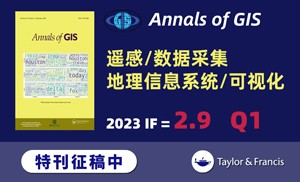当前位置:
X-MOL 学术
›
Food Energy Secur.
›
论文详情
Our official English website, www.x-mol.net, welcomes your
feedback! (Note: you will need to create a separate account there.)
Diversified crop rotations enhance groundwater and economic sustainability of food production
Food and Energy Security ( IF 4.0 ) Pub Date : 2021-07-09 , DOI: 10.1002/fes3.311 Xiaolin Yang 1 , Tammo S. Steenhuis 2 , Kyle Frankel Davis 3, 4 , Wopke Werf 5 , Coen J. Ritsema 6 , Steven Pacenka 2 , Fusuo Zhang 7 , Kadambot H. M. Siddique 8 , Taisheng Du 1
Food and Energy Security ( IF 4.0 ) Pub Date : 2021-07-09 , DOI: 10.1002/fes3.311 Xiaolin Yang 1 , Tammo S. Steenhuis 2 , Kyle Frankel Davis 3, 4 , Wopke Werf 5 , Coen J. Ritsema 6 , Steven Pacenka 2 , Fusuo Zhang 7 , Kadambot H. M. Siddique 8 , Taisheng Du 1
Affiliation

|
Earth's water resources are critical for supporting livelihoods and food security but are being increasingly overexploited to support global agriculture. Diversifying cropping systems could potentially resolve unsustainable water use but trade-offs with other aspects of sustainability and food security have not yet been assessed. We performed a detailed analysis of 31 different field crop rotations conducted during 1990–2019 in the North China Plain, to assess the potential impact of crop diversification on actual evapotranspiration (ETa), changes in regional groundwater table, grain yield, economic output, and water use efficiency (WUE) and to identify configurations that can achieve co-benefits across multiple dimensions. We found that a combination of lowering the cropping index (i.e., harvest frequency), incorporating fallow periods, and introducing higher-value crops into the currently dominant winter wheat–summer maize double cropping system can reduce growing season ETa by as much as 31%, mitigate groundwater decline by 19% or more, and increased economic output and economic WUE by more than 11% and 3%, respectively. We also found that multiple diversified wheat-maize–based rotations—all with rotation lengths greater than 2 years—achieve co-benefits across all evaluated dimensions. This study provides new empirical evidence of the opportunities for diversified crop rotations to balance the multiple objectives of food production, sustainable groundwater use, and farmer profitability. Extending this solution to other water-stressed agricultural regions could be an effective strategy in achieving more sustainable food production system globally.
中文翻译:

多样化的轮作提高了地下水和粮食生产的经济可持续性
地球的水资源对于支持生计和粮食安全至关重要,但正日益过度开发以支持全球农业。多样化的种植系统可能会解决不可持续的用水问题,但尚未评估与可持续性和粮食安全其他方面的权衡。我们对 1990-2019 年间在华北平原进行的 31 种不同的大田作物轮作进行了详细分析,以评估作物多样化对实际蒸散量的潜在影响(ET a)、区域地下水位、粮食产量、经济产出和用水效率 (WUE) 的变化,并确定可以在多个维度上实现协同效益的配置。我们发现,降低种植指数(即收获频率)、纳入休耕期以及在目前占主导地位的冬小麦-夏玉米双熟系统中引入高价值作物可以减少生长季节ET a减少多达 31%,将地下水减少 19% 或更多,经济产出和经济 WUE 分别增加 11% 和 3% 以上。我们还发现,基于小麦玉米的多种多样化轮作——所有轮作长度均大于 2 年——在所有评估维度上实现了共同效益。这项研究提供了新的经验证据,证明多样化的轮作机会可以平衡粮食生产、可持续地下水利用和农民盈利能力的多重目标。将此解决方案扩展到其他缺水的农业地区可能是在全球实现更可持续的粮食生产系统的有效战略。
更新日期:2021-07-09
中文翻译:

多样化的轮作提高了地下水和粮食生产的经济可持续性
地球的水资源对于支持生计和粮食安全至关重要,但正日益过度开发以支持全球农业。多样化的种植系统可能会解决不可持续的用水问题,但尚未评估与可持续性和粮食安全其他方面的权衡。我们对 1990-2019 年间在华北平原进行的 31 种不同的大田作物轮作进行了详细分析,以评估作物多样化对实际蒸散量的潜在影响(ET a)、区域地下水位、粮食产量、经济产出和用水效率 (WUE) 的变化,并确定可以在多个维度上实现协同效益的配置。我们发现,降低种植指数(即收获频率)、纳入休耕期以及在目前占主导地位的冬小麦-夏玉米双熟系统中引入高价值作物可以减少生长季节ET a减少多达 31%,将地下水减少 19% 或更多,经济产出和经济 WUE 分别增加 11% 和 3% 以上。我们还发现,基于小麦玉米的多种多样化轮作——所有轮作长度均大于 2 年——在所有评估维度上实现了共同效益。这项研究提供了新的经验证据,证明多样化的轮作机会可以平衡粮食生产、可持续地下水利用和农民盈利能力的多重目标。将此解决方案扩展到其他缺水的农业地区可能是在全球实现更可持续的粮食生产系统的有效战略。









































 京公网安备 11010802027423号
京公网安备 11010802027423号